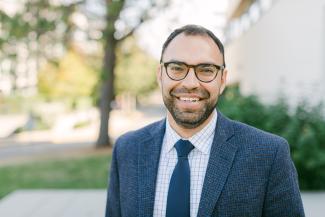
Dr. Hassan Ahmad is a scholar, advocate and activist who studies the law’s transformative role in making the global economy more humane for marginalized communities, in Canada and internationally. On July 1, the Allard School of Law welcomed Dr. Ahmad as an assistant professor.
An expert in transnational tort law, international law, business and human rights law, and law and political economy, Dr. Ahmad has been recognized as an emerging scholar by both the American Society of International Law and the American Society of Comparative Law. He’s also a regular media commentator, and has appeared in national media outlets including The Globe and Mail, the CBC and CTV News.
At Allard Law, Dr. Ahmad will be teaching Administrative Law this spring and coaching the law school’s Jessup Moot team.
In this Q&A, Dr. Ahmad discusses his current research and why the role of tort law in political and economic disputes is so critical.
What are your research interests?
My research looks at how we resolve disputes around egregious human rights and environmental harms in our increasingly globalized world. Traditional notions of state sovereignty are disappearing, and in many ways we now live in a borderless world where non-state actors — individuals, corporations, movements, ideas, technology — possess inordinate power.
I’m interested in disputes that involve an imbalance of power, be it political or economic power, in Canada or transnationally. For instance, a textiles company may mistreat its foreign employees, a government may torture an inmate, or a mining company may forcibly expel an Indigenous community from its land in order to extract natural resources. How is the law currently structured around these disputes? Is there room to enhance the law in order to mitigate existing inequities?
Even more than contemporary governments, I see corporations as being the greatest influence on our world today.
With my background as a litigator, I’ve focused on how these complex disputes are adjudicated in state-sanctioned courts, mainly in the common law world, but also elsewhere where courts are increasingly confronting claims that involve parties and issues rooted in different parts of the world. These disputes are often brought under the law of torts.
Tell us about your current research projects.
I recently defended my doctoral thesis, which examines tort-based disputes between powerful transnational corporate actors and individuals from poorer and historically oppressed countries who have experienced human rights and environmental harms.
In my doctoral work, I analyzed how these types of disputes were adjudicated in the colonial period with respect to the first transnational corporate actors: the East India Company, the Royal African Company, etc., and how they are adjudicated today with the largest corporations we all know that operate in poorer parts of the world: oil and mining companies, shoe companies, food and beverage companies, etc. Over the next several months, I’m converting my thesis into a book manuscript and submitting proposals to publishers.
How can tort litigation alter corporate behaviour and oblige future corporations to make decisions that take human rights and environmental impacts into account?
My next big project will expand on my past work on business and human rights litigation. I’m researching other types of disputes that are now resulting in complex tort claims— for instance, climate change litigation and what I call arms and ammunition litigation, where victims sue gun and weapons manufacturers. I’m also delving into tort theory and how it can be expanded or re-envisioned to keep pace with the types of disputes coming before the courts today.
Like previous projects, I’m focusing on the conduct of large corporations. Even more than contemporary governments, I see corporations as being the greatest influence on our world today. How can tort litigation alter corporate behaviour and oblige future corporations to make decisions that take human rights and environmental impacts into account?
What do you look forward to most about being a part of the Allard community?
First and foremost, I’m thrilled to be amongst a group of like-minded scholars and teachers who are dedicated to their craft and also want to make an impact in the real world through their work. Every law school has a slightly different vibe. When I interviewed at Allard, I realized fairly quickly that the culture here aligns with my current and future ambitions. Alongside that, I love interacting and even collaborating with students at both the JD and graduate levels. That is an invaluable part of the job and brings me a lot of joy.
Allard and UBC, more generally, come with so many professional opportunities, from collaborating with scholars in different faculties to improving teaching methods to accessing grant funding. We find ourselves at a world-class institution. I’m excited about the resources and relationships that stem from being here. And, of course, we are in one of the most beautiful and dynamic cities in the world. I lived in Vancouver about a decade ago, so it’s great to be back!


